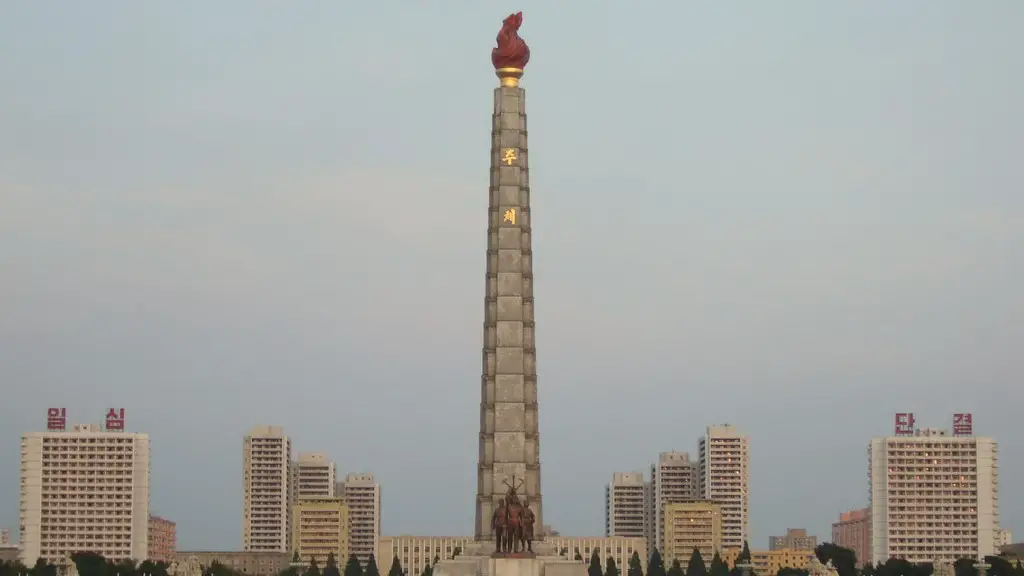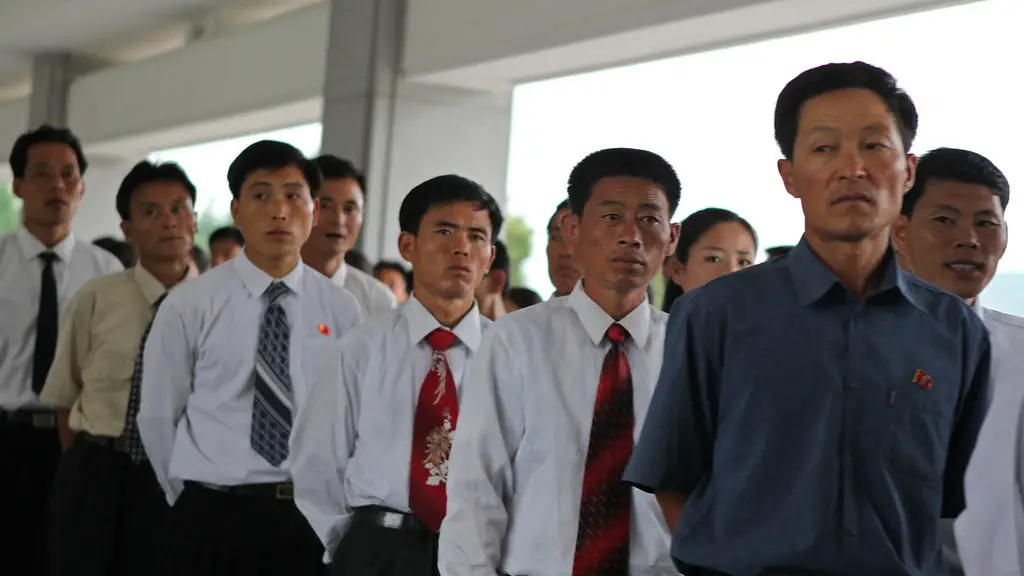A complex international relationship, the growth of China’s economic and political power, and nuclear ambitions in North Korea are all factors in determining if Beijing would support the communist state. As a major ally and the only major power to have consistently supported North Korea over the past-decades, the Chinese have long sought to balance their relationship with Pyongyang with its commitment to global stability and economic interests.
China is the main economic partner of North Korea. Its willingness to provide economic and energy aid, despite UN sanctions, has kept the regime afloat. China’s support has been essential in propping up North Korea’s economy since the end of the Cold War. Through trade programs, Beijing has provided Pyongyang with a lifeline, including food, fuel, and fertilizer. In addition, China has thrown its political weight behind North Korea in international forums, shielding Pyongyang from much of the international criticism it has received.
However, China’s relationship with North Korea is not entirely one-sided. North Korea provides China with a buffer against US-influenced countries in the region, and its proximity has been useful in terms of economic exchanges and access to resources.
“China wants to be in a position of strength when it comes to North Korea. It’s not willing to see a nuclear armed North Korea or a country on the brink of collapse. It’s in China’s best interest to ensure North Korea remains stable and within China’s sphere of influence,” says Qing Li, an economist at Beijing University.
Despite these mutually beneficial interests, it is difficult to accurately assess the extent to which China would support North Korea, given the complexities and competing interests at play. For example, Beijing has been willing to engage in high-level political talks as well as impose economic sanctions against Pyongyang. In recent years, China has applied economic restrictions in response to North Korean nuclear testings, and have also suspended coal imports. Beijing is a key player in the denuclearization talks, with its role being both constructive and decisive.
Furthermore, regardless of the complex dynamics at play, a closer analysis of Sino-North Korean relations reveals a certain level of pragmatism in China’s approach. It is clear that China will not risk its relationships with the United States and other nations in the international community to maintain its support for North Korea. China’s actions appear driven less by an ideological commitment to North Korea and more by a desire to ensure global stability, its own economic and strategic interests, and a continuing access to valuable resources.
China’s Relations with International Powers
Beijing is highly engrained in the international community and has sought to actively engage with other nations, both diplomatically and economically. China has built strong relations with numerous key players in the international system, including the US and members of the European Union. As such, it is in Beijing’s interest not to publicly or actively support North Korea. This is because it would damage China’s reputation on the international stage, as well as its relationships with other powers.
China’s foreign policy involves taking a pragmatic and balanced approach to international relations, often straddling competing interests. In the context of Sino-North Korean relations, this means that Beijing is not willing to alienate or openly support Pyongyang, but is also averse to causing too much instability in the region.
Wang Sheng, Deputy Director of the International Relations Institute at Peking University says: “China’s official position is to maintain peace and stability on the Korean Peninsula and in the region. Beijing has been trying to strike a delicate balance between deterring North Korea’s aggression and providing support and protection to the regime.”
Economic Interests in North Korea
China has economic interests in North Korea, largely centered around access to natural resources for export. China depends on North Korean resources to strengthen its economy, and has invested heavily in infrastructure projects in the country. These investments have given China a massive inroad into the North Korean economy, strengthening its presence and influence in the region.
China is also North Korea’s foremost trading partner, with bilateral trade being close to $6 billion, according to China Ministry of Commerce data. However, China’s actual economic assistance to North Korea is likely to be much higher than this figure, as much of the trade such as in oil, rare earths, and technology goods is done off the books.
More recently, Beijing has sought to increase Chinese investments in the North Korean economy. Chinese companies are involved in multiple sectors, including mining, oil and gas exploration, engineering and infrastructure development.
Thus, it is in China’s economic interests to maintain access to North Korean resources. This provides China with economic leverage, albeit limited, which it can use to influence the regime in Pyongyang and gain access to strategic resources.
Pros and Cons of Supporting North Korea
For China, there are both advantages and disadvantages to overtly supporting North Korea. Beijing sees economic incentives in its economic ties with Pyongyang, but at the same time, it faces the risk of increased international condemnation if it is seen to be aiding a country with nuclear ambitions.
This is a delicate balance that Beijing must maintain, as it seeks to ensure stability in the region and build strong economic ties with North Korea. It must ensure that its support for the regime does not threaten its relationships with key international players, such as the US and its allies.
This is why China has taken a subtle and nuance approach towards North Korea, backing it economically while also supporting the international community’s efforts to add pressure on Pyongyang to denuclearise.
In this way, it is possible to argue that China would support North Korea, but not to the extent of openly destabilising the region or putting its own interests at risk.
US-Sino Relations
An important factor in determining China’s position towards North Korea is its relationship with the US. Relations between the two countries have been fraught since Donald Trump’s election to the US Presidency, and Trump has been heavily critical of Beijing’s dealings with North Korea.
Beijing is aware that the US holds considerable leverage in the international arena and is reluctant to risk its relationship with Washington by fully supporting Pyongyang. This is compounded by the fact that Trump has made the denuclearization of North Korea a key priority for his administration and has threatened to take military action if Pyongyang does not comply.
Additionally, China is aware that its support for North Korea could come under greater scrutiny if it enters into any trade or military agreement with the US. Thus, it is clear that China’s relationship with the US plays a key role in influencing its attitude towards North Korea.
Chinese Foreign Policy and North Korea
Overall, it is clear that China’ is taking a measured and balanced approach to its relationship with North Korea. It appears that Beijing will continue to provide economic and political support to Pyongyang, while also applying enough pressure to ensure that North Korea remains within its sphere of influence.
However, ultimately, the extent and nature of China’s support for North Korea is dependent on a variety of factors, and it is difficult to predict with certainty how much support Beijing will provide in the future.
Role of the United Nations Security Council
The United Nations Security Council is an international body made up of 15 member states, including China and the United States. As such, the Security Council can play an important role in influencing China’s decision-making process when it comes to North Korea. The council has the power to pass resolutions which can impose sanctions and other measures against North Korea, and China has demonstrated a willingness to take part in such discussions.
The Security Council can also be instrumental in applying diplomatic pressure on Beijing to ensure that it takes a hard line on North Korea. In recent months, the council has adopted a tougher stance against Pyongyang, and China is likely to take this into account when deciding to what extent it will support the North Korean regime.
Impact of UN Sanctions on Sino-North Korean Relations
The UN Security Council has imposed a number of sanctions against North Korea since 2006 in an effort to curb Pyongyang’s nuclear ambitions. The sanctions, which were tightened in 2017, have had an effect on Sino-North Korean relations. Beijing has maintained that it is fully compliant with the sanctions, though reports have suggested that there have been breaches in the past.
These sanctions have had a direct impact on China’s economic ties with North Korea. For example, China’s exports to North Korea fell by a quarter in 2018, compared to 2017, and energy imports fell by nearly half. This has had a noticeable economic impact on North Korea, and it is also likely to have an effect on China’s relationship with Pyongyang.
As such, it is evident that the UN sanctions have, and will continue to, have an impact on the extent of China’s support for North Korea. Ultimately, the sanctions, and their success in forcing Pyongyang to denuclearize, could heavily influence the Sino-Korean relationship going forward.





